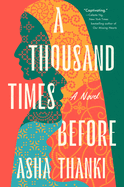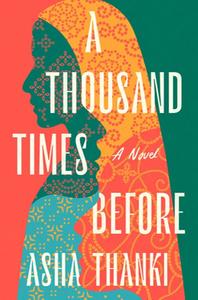
 Asha Thanki's powerful debut novel, A Thousand Times Before, weaves together a complex family saga with the 20th-century history of India and Pakistan. As the novel begins, Ayukta sits down with her wife, Nadya, to address the question of whether to have a child. She confesses she has avoided the conversation, and shares the reason why: the women in her family pass down a tapestry that gives each chosen recipient access to their ancestors' memories. Ayukta unspools the story of her grandmother Amla's life, then her mother Arni's, before she recounts her own story. In doing so, she connects their hardships, their heartbreaking losses, and their enduring courage to her present-day experiences.
Asha Thanki's powerful debut novel, A Thousand Times Before, weaves together a complex family saga with the 20th-century history of India and Pakistan. As the novel begins, Ayukta sits down with her wife, Nadya, to address the question of whether to have a child. She confesses she has avoided the conversation, and shares the reason why: the women in her family pass down a tapestry that gives each chosen recipient access to their ancestors' memories. Ayukta unspools the story of her grandmother Amla's life, then her mother Arni's, before she recounts her own story. In doing so, she connects their hardships, their heartbreaking losses, and their enduring courage to her present-day experiences.
The narrative delves into Amla's peaceful early life as an only child in Karachi, then her devastation when her mother travels to a family wedding in Delhi and is caught up in the riots preceding the 1947 Partition. Amla and her father soon flee Karachi, leaving behind Amla's bosom friend, a Muslim girl named Fiza. Arriving in Gujarat, they move into a house belonging to her mother's grandmother, and her father begins working for the local landowner. Later, Amla will witness a tragedy that leaves a deep mark on her, but her years in Gujarat also shape who she will become as a young woman, as she tries to access the memories stored in her mother's tapestry.
Thanki's narrative brims with sensory detail: the flavors of mithai (sweets) in Amla's father's shop; the taste of chaash (buttermilk); the vivid colors of saris and dupattas worn by women and girls. Thanki also writes evocatively of Amla's loneliness, her longing for Fiza, and the difficulty of bridging the gap caused by distance and new experiences. Eventually, Ayukta relates the story of her mother, Arni, the impulsive but talented second daughter of Amla and her husband. Arni inherits the tapestry and later immigrates to New York City as a student to build a life in a new, cold country far away from everything she has known. Ayukta speaks, too, of her own struggle to accept the tapestry and its gift, her deep love for the women she comes from, and the magic and burden of their memories.
Evocative, sweeping, and intimate, A Thousand Times Before explores Indian politics, the different ways to love a person, and the complexities of family: what we inherit, what we build for ourselves, and what we choose to keep. --Katie Noah Gibson, blogger at Cakes, Tea and Dreams
Shelf Talker: Asha Thanki's luminous debut novel traces the multigenerational history of an Indian family through a tapestry that allows women to access their ancestors' memories.

